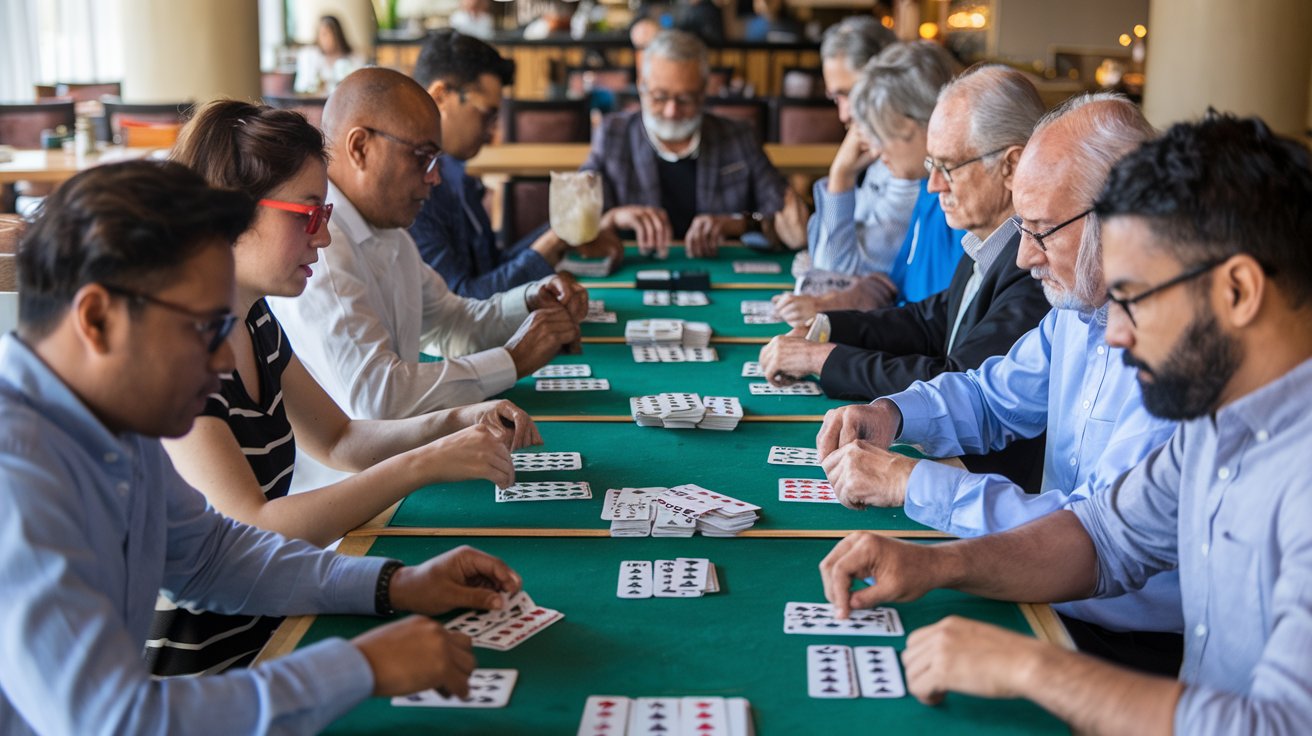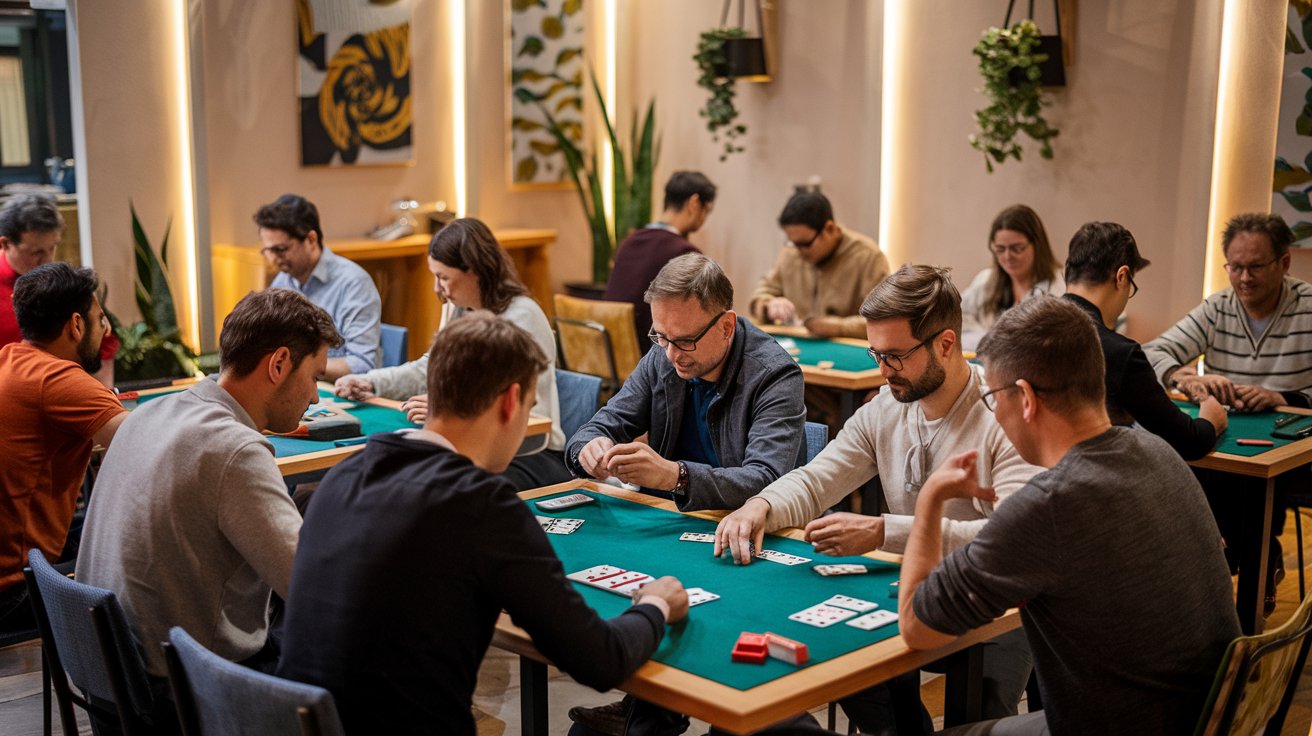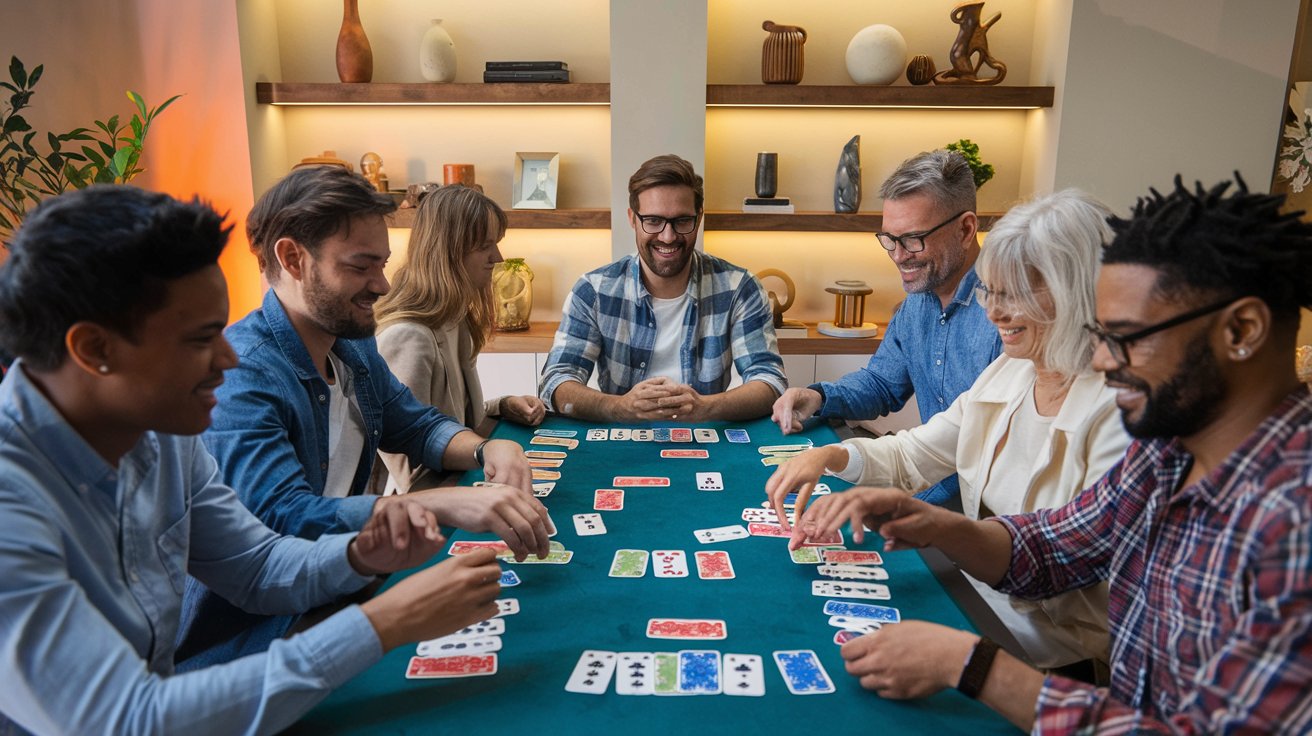In a fast-paced, technology-driven world, finding ways to connect with others can sometimes feel like a challenge. Enter rummy—a timeless card game that has been bridging gaps and fostering relationships for generations. Far more than just a pastime, rummy is a social game that brings people together, encouraging laughter, strategy, and camaraderie. Whether it’s a family gathering, a friendly get-together, or an online match with players across the globe, rummy has a unique ability to unite people in a shared experience. In this blog, we’ll explore how rummy serves as a social glue, its history as a community-building game, and why it continues to thrive in the digital age.
The Social Roots of Rummy

Rummy’s origins are steeped in social interaction. While its exact beginnings are debated, many historians trace it back to the 19th century, with influences from games like Conquian in Mexico and Mahjong in China. What’s clear is that rummy was designed to be played with others. Unlike solitary games, rummy thrives on the dynamics of a group—whether it’s two players engaged in a head-to-head duel or a lively table of four or more.
At its core, rummy is simple yet strategic. Players aim to form sets and runs by drawing and discarding cards, all while keeping an eye on their opponents’ moves. This blend of skill and chance creates an environment ripe for conversation, friendly banter, and even a little competitive spirit. It’s no wonder that rummy quickly became a staple at social gatherings, from cozy living rooms to bustling community halls.
Why Rummy is the Ultimate Social Game
1. Accessibility for All Ages
One of rummy’s greatest strengths is its universal appeal. The rules are straightforward enough for beginners to pick up, yet the game offers enough depth to keep seasoned players engaged. This accessibility makes it a perfect choice for mixed groups—think grandparents teaching their grandkids, or friends introducing newcomers to the game. No matter the age or skill level, everyone can join in, making rummy a natural icebreaker.
2. Encourages Face-to-Face Interaction
In an era dominated by screens, rummy offers a refreshing return to face-to-face connection. Sitting around a table, shuffling cards, and reading opponents’ expressions fosters a sense of presence that digital interactions often lack. The game’s pace—slow enough to chat between turns but fast enough to stay engaging—creates a relaxed atmosphere where stories are shared, jokes are told, and bonds are strengthened.
3. A Platform for Friendly Competition
There’s something inherently social about competition, and rummy delivers it in spades. Whether you’re bluffing your way through a tricky hand or celebrating a well-earned victory, the game sparks excitement and interaction. The lighthearted rivalries that emerge during a rummy match often lead to laughter and memorable moments, turning strangers into friends and friends into closer companions.
4. Flexibility for Any Setting
Rummy’s versatility adds to its social charm. It can be played with a standard deck of cards, requiring no fancy equipment or large spaces. Host a rummy night at home, bring a deck to a picnic, or even play a quick round during a break at work—rummy adapts to any occasion. This flexibility ensures it remains a go-to game for bringing people together, no matter the circumstances.
Rummy Through the Ages: A Legacy of Togetherness

Rummy’s role as a social game isn’t a modern phenomenon—it’s been connecting people for centuries. During the Great Depression in the 1930s, rummy surged in popularity as families sought affordable entertainment. Card tables became hubs of community, where neighbors gathered to escape their worries and enjoy each other’s company. In the mid-20th century, rummy variants like Gin Rummy gained fame, even appearing in Hollywood films as a symbol of sophistication and social bonding.
Across cultures, rummy has taken on local flavors while retaining its social essence. In India, for example, Indian Rummy (or Paplu) is a beloved pastime, especially during festivals like Diwali, where families and friends play late into the night. The game’s ability to transcend borders and generations speaks to its enduring power as a tool for connection.
Rummy in the Digital Age: Expanding the Social Circle
While rummy’s traditional roots lie in physical gatherings, the digital revolution has taken it to new heights. Online rummy platforms have exploded in popularity, allowing players to connect with others worldwide. Far from diluting its social nature, technology has amplified it, creating virtual communities where people chat, compete, and collaborate.
Online Rummy: A Modern Twist on a Classic
Platforms like RummyCircle, Junglee Rummy, and Ace2Three offer seamless gameplay with features like live chat, tournaments, and multiplayer modes. Players can join friends for a private game or meet new opponents in real-time matches. The convenience of playing anytime, anywhere has made rummy more accessible than ever, ensuring it remains a social lifeline even for those separated by distance.
Building Global Friendships
Online rummy transcends geographical boundaries, connecting people who might never have met otherwise. Imagine a player in New York teaming up with someone in Mumbai for a quick game, exchanging tips and small talk along the way. These interactions, though virtual, mirror the social dynamics of a traditional rummy table, proving that the game’s essence endures in the digital realm.
Balancing Screen Time with Real Connections
Of course, the rise of online rummy doesn’t mean abandoning the classic experience. Many enthusiasts use digital platforms to sharpen their skills before hosting in-person game nights. Blending online and offline play keeps rummy’s social spirit alive, offering the best of both worlds.
How to Host a Rummy Night: Tips for Maximum Fun

Ready to bring people together with rummy? Hosting a rummy night is a fantastic way to create lasting memories. Here’s how to make it a hit:
1. Set the Scene
Create a welcoming vibe with comfortable seating, good lighting, and a spacious table. Add snacks like chips, popcorn, or homemade treats to keep the energy up. A playlist of mellow tunes can enhance the mood without distracting from the game.
2. Choose Your Variant
Rummy has many flavors—Gin Rummy, Indian Rummy, Rummy 500, and more. Pick one that suits your group’s preferences and skill levels. For beginners, classic rummy with simple rules is a great starting point.
3. Keep It Casual
The goal is connection, not cutthroat competition. Encourage players to chat, laugh, and enjoy the process. If someone’s new to the game, pair them with a patient mentor to ease them in.
4. Add a Twist
Spice things up with small prizes for winners (think candy, a quirky trophy, or bragging rights). You could also introduce a themed night—Diwali Rummy, anyone?—to tie the game to a special occasion.
5. Go Hybrid
If some friends can’t make it in person, set up an online table and blend the physical and virtual experience. This inclusivity ensures no one misses out on the fun.
The Mental and Emotional Benefits of Social Rummy
Beyond its social perks, rummy offers mental and emotional boosts that enhance the group experience. The game sharpens focus, memory, and strategic thinking—skills that players can flex while chatting and joking. Winning a tough hand or outsmarting an opponent brings a rush of satisfaction, while losing gracefully teaches resilience and sportsmanship.
Emotionally, rummy fosters a sense of belonging. Sharing a game creates a shared narrative—those “remember when” moments that strengthen relationships. For introverts, it’s a low-pressure way to engage; for extroverts, it’s a stage to shine. In every case, rummy builds bridges.
Rummy’s Future: A Social Game for Generations to Come
As we look ahead, rummy’s role as a social game seems secure. Its adaptability—spanning physical cards, mobile apps, and even augmented reality potential—ensures it will evolve with the times. Yet its heart remains unchanged: bringing people together. Whether it’s a family passing down traditions, friends unwinding after a long week, or strangers bonding over a digital table, rummy’s magic lies in its ability to create connection.
In 2025 and beyond, as social isolation remains a concern, rummy offers a remedy. It’s a reminder that human interaction doesn’t need to be complicated—just a deck of cards, a few willing players, and a willingness to enjoy the moment.
Conclusion: Deal the Cards, Build the Bonds
Rummy is more than a game; it’s a social phenomenon that has united people across time and space. From its humble beginnings to its digital resurgence, it continues to prove that shared experiences are the foundation of relationships. So, the next time you’re looking to connect—with family, friends, or even new acquaintances—grab a deck or log into an app, and let rummy work its magic. After all, in a world that sometimes feels divided, a simple card game might just be the perfect way to bring us back together.

Zareb Saleh is a journalist at Gulf Today and a ghostwriter for Gameoholic, specializing in gaming, technology, and digital culture. With a keen eye for industry trends, he delivers insightful stories that engage and inform readers.




